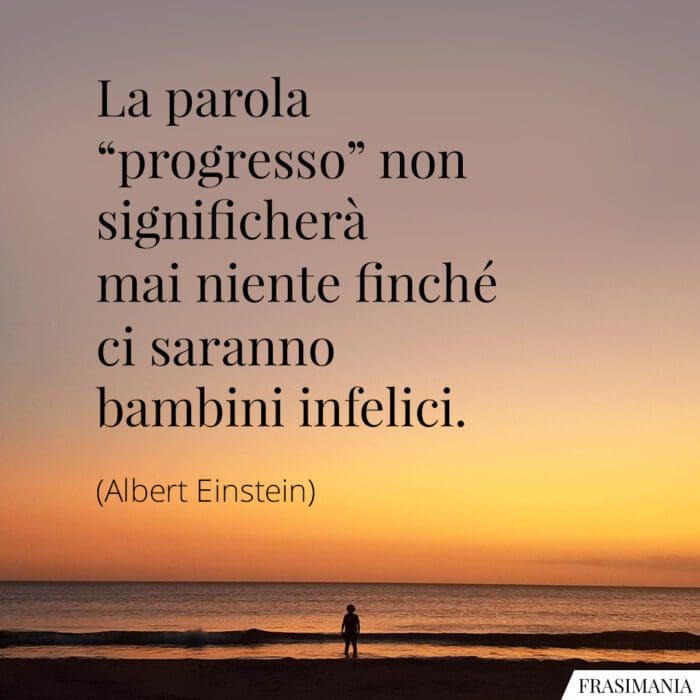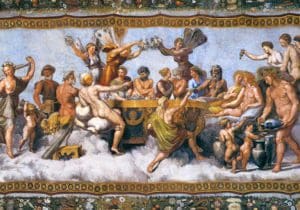
Ci sono tante ricette al mondo per raggiungere la felicità, ma non sempre funzionano e non sempre vanno bene per tutti. A volte basta saper aspettare, altre agire.
Altre volte, semplicemente, l’infelicità ci prende e non riusciamo più a liberarcene.
Ecco quindi una selezione di frasi sull’infelicità (in inglese e italiano) che ci aiuteranno a comprenderla e a superarla. Scoprile subito!
Aforismi, citazioni e frasi sull’infelicità in inglese (con traduzione)
- You can not be unhappy when you have this: the smell of the sea, the sand beneath your fingers, the air, the wind.
Non si può essere infelici quando si ha questo: l’odore del mare, la sabbia sotto le dita, l’aria, il vento.
(Irène Némirovsky) 
- The greatest happiness is to know the source of unhappiness.
La più grande felicità è conoscere la fonte dell’infelicità.
(Fyodor Dostoevsky) - Perfect happiness – something very near to sadness.
La vera felicità è qualcosa di molto vicino alla tristezza.
(Charlie Chaplin) 
- The safest way of not being very miserable is not to expect to be very happy.
Per non diventare molto infelici il mezzo più sicuro sta nel non pretendere di essere molto felici.
(Arthur Schopenhauer) - How bitter a thing it is to look into happiness through another man’s eyes.
Com’è amaro guardare la felicità attraverso gli occhi di un altro.
(William Shakespeare) 
- The happiness or unhappiness of men depends no less upon their dispositions than their fortunes.
La felicità e l’infelicità degli uomini dipendono tanto dal loro stato d’animo quanto dalla fortuna.
(François de La Rochefoucauld) - Many people lose the small joys in the hope for the big happiness.
Molte persone si perdono le piccole gioie nella speranza della grande felicità.
(Pearl S. Buck) 
- Unhappy is he to whom the memories of childhood bring only fear and sadness.
Infelice è colui al quale i ricordi dell’infanzia portano solo paura e tristezza.
(H. P. Lovecraft) - Where fear is, happiness is not.
Dove c’è paura, non c’è felicità.
(Lucio Anneo Seneca) - How noble is the sad heart, whose sadness doesn’t keep him from singing a song with the happy hearts.
Come è nobile chi, col cuore triste, vuol cantare ugualmente un canto felice, tra cuori felici.
(Khalil Gibran) 
- There is no happiness without knowledge. But knowledge of happiness is unhappy; for knowing ourselves happy is knowing ourselves passing through happiness, and having to, immediatly at once, leave it behind. To know is to kill, in happiness as in everything. Not to know, though, is not to exist.
Non c’è felicità se non con consapevolezza. Ma la consapevolezza della felicità è infelice, perché sapersi felice è sapere che si sta attraversando la felicità e che si dovrà subito lasciarla. Sapere è uccidere, nella felicità come in tutto.
(Fernando Pessoa) - You know… when you are sad you love the sunsets.
Sai… quando si è molto tristi si amano i tramonti.
(Antoine de Saint-Exupéry) 
- Selfish or neurotic people can twist anything, even love, into some sort of misery or exploitation.
Le persone egoiste o nevrotiche possono trasformare qualsiasi cosa, persino l’amore, e farlo diventare causa di infelicità o di sfruttamento.
(C. S. Lewis) - The word “progress” has no meaning as long as unhappy children exist.
La parola “progresso” non significherà mai niente finché ci saranno bambini infelici.
(Albert Einstein) 
- The waste of life lies in the love that we have not been able to give, in power that we have not been able to use, in the selfish prudence that prevented us from taking risks and that, by so avoiding displeasure, made us miss happiness.
Lo spreco della vita si trova nell’amore che non si è saputo dare, nel potere che non si è saputo utilizzare, nell’egoistica prudenza che ci ha impedito di rischiare e che, evitandoci un dispiacere, ci ha fatto mancare la felicità.
(Oscar Wilde) - Life is full of happiness and tears; be strong and have faith.
La vita è piena di felicità e lacrime; sii forte e abbi fede.
(Kareena Kapoor Khan) 
- We never taste a perfect joy; our happiest successes are mixed with sadness.
Non proviamo mai una gioia perfetta; i nostri successi più felici sono mescolati con la tristezza.
(Pierre Corneille) - Unhappiness is necessary to understand the joy, the doubt to understand the truth… the death to understand the life.
Serve l’infelicità per comprendere la gioia, il dubbio per capire la verità… la morte per capire la vita. Quindi affronta e abbraccia la tristezza quando viene.
(Madre Teresa di Calcutta) - I recognized happiness by the noise it made when it left.
Ho riconosciuto la felicità dal rumore che ha fatto andandosene.
(Jacques Prévert) 
- Man is unhappy because he doesn’t know he’s happy. If anyone finds out he’ll become happy at once.
L’uomo è infelice perché non sa di essere felice. Se qualcuno lo scopre che diventerà felice in un attimo.
(Fyodor Dostoevsky) - It is an illusion that youth is happy, an illusion of those who have lost it.
È un’illusione che la gioventù sia felice, l’illusione di coloro che l’hanno persa.
(William Somerset Maugham) - You may never be happy. So you just have to dance, dance so well that you leave everyone speechless.
Può darsi che non sarai mai felice. Perciò non ti resta che danzare, danzare così bene da lasciare tutti a bocca aperta.
(Haruki Murakami) 
- I have committed the worst sin than a man can commit: I have not been happy.
Ho commesso il peggiore dei peccati che un uomo possa commettere. Non sono stato felice.
(Jorge Luis Borges) - I have all the conditions for happiness, save happiness.
Ho tutte le condizioni per essere felice, tranne la felicità.
(Fernando Pessoa) - Some people aren’t bad. They are unhappy.
Certa gente non è cattiva. È Infelice.
(Alda Merini) 
- Sooner or later in life everyone discovers that perfect happiness is unrealizable, but there are few who pause to consider the antithesis: that perfect unhappiness is equally unattainable. The obstacles preventing the realization of both these extreme states are of the same nature: they derive from our human condition which is opposed to everything infinite.
Tutti scoprono, più o meno presto nella loro vita, che la felicità perfetta non è realizzabile, ma pochi si soffermano invece sulla considerazione opposta: che tale è anche una infelicità perfetta. I momenti che si oppongono alla realizzazione di entrambi i due stati-limite sono della stessa natura: conseguono dalla nostra condizione umana, che è nemica di ogni infinito.
(Primo Levi) - No man is happy unless he believes he is.
Non è felice chi non si considera felice.
(Publilio Siro) 
- Melancholy is the enjoyment of being sad.
La malinconia è la gioia di essere tristi.
(Victor Hugo) - It is only to the happy that tears are a luxury.
Soltanto per quelli felici le lacrime sono un lusso.
(Thomas Moore) - There is no greater sorrow than to recall in misery the time when we were happy.
Nulla addolora maggiormente che ripensare ai momenti felici quando si è nel dolore.
(Dante Alighieri) 
- While money can’t buy happiness, it certainly lets you choose your own form of misery.
Anche se il denaro non può comprare la felicità, ti permette comunque di scegliere la tua forma di infelicità.
(Groucho Marx) - Man is unhappy because he doesn’t know he’s happy; only because of that. It’s everything, everything, Whoever learns will at once immediately become happy, that same moment.
L’uomo è infelice perché non sa di essere felice. Soltanto per questo. Questo è tutto, tutto! Chi lo comprende sarà subito felice, immediatamente, nello stesso istante.
(Fëdor Dostoevskij) - People don’t notice whether it’s winter or summer when they’re happy.
La gente non si accorge se è estate o inverno quando è felice.
(Anton Čechov) 
- The word “happy” would lose its meaning if it was not balanced by sadness.
La parola “felice” perderebbe il suo significato se non fosse bilanciata dalla tristezza.
(Carl Jung) - The best remedy for those who are afraid, lonely or unhappy is to go outside, somewhere where they can be quiet, alone with the heavens, nature and God. Because only then does one feel that all is as it should be.
Il miglior rimedio per chi ha paura, o si sente incompreso e infelice, è andar fuori all’aperto, in un luogo dove egli sia completamente solo, solo col cielo, la natura e Dio. Soltanto così potrà sentire che tutto è come dovrebbe essere.
(Anna Frank) - The saddest people always try their hardest to make people happy because they know what it’s like to feel absolutely worthless and they don’t want anyone else to feel like that.
Sono le persone che hanno sofferto a fare del loro meglio per rendere felici le altre persone. Perché sanno cosa significa stare male e non vogliono che nessun altro si senta in quel modo.
(Robin Williams) 
- I’m really afraid to feel happy because it never lasts.
Ho davvero paura di sentirmi felice perché la felicità non dura.
(Andy Warhol) - We are a society of notoriously unhappy people: lonely, anxious, depressed, destructive, dependent – people who are glad when we have killed the time we are trying so hard to save.
La nostra è una società composta da individui notoriamente infelici: isolati, ansiosi, in preda a stati depressivi e a impulsi distruttivi, incapaci di indipendenza, in una parola esseri umani ben lieti di poter ammazzare il tempo che con tanto accanimento cercano di risparmiare.
(Erich Fromm) - Being miserable is a habit. Being happy is a habit. The choice is yours.
Essere infelici è un’abitudine. Essere felici è un’abitudine. La scelta spetta a te.
(Tom Hopkins) 
- Even his griefs are a joy long after to one that remembers all that he wrought and endured.
Persino i dolori sono una gioia quando dopo tanto tempo ci si ricorda di tutto quello che si è fatto e sopportato.
(Omero) - Happiness is a shadow which instantly vanishes from the grasp.
La felicità è un’ombra che svanisce nell’istante in cui la si afferra.
(Sofocle) - A fool with a heart and no sense is just as unhappy as a fool with sense and no heart.
Uno sciocco col cuore, ma senza cervello è uno sciocco altrettanto infelice di uno col cervello ma senza cuore.
(Fëdor Dostoevskij)

















